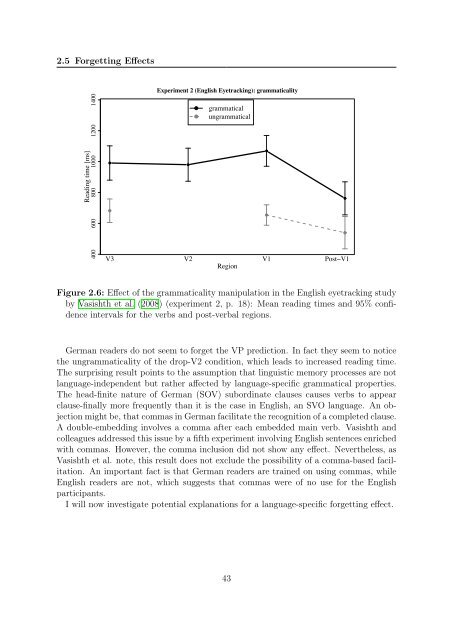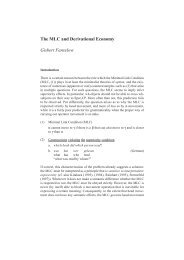Connectionist Modeling of Experience-based Effects in Sentence ...
Connectionist Modeling of Experience-based Effects in Sentence ...
Connectionist Modeling of Experience-based Effects in Sentence ...
Create successful ePaper yourself
Turn your PDF publications into a flip-book with our unique Google optimized e-Paper software.
2.5 Forgett<strong>in</strong>g <strong>Effects</strong> SHORT-TERM FORGETTING 18<br />
Read<strong>in</strong>g time [ms]<br />
400 600 800 1000 1200 1400<br />
Experiment 2 (English Eyetrack<strong>in</strong>g): grammaticality<br />
grammatical<br />
ungrammatical<br />
V3 V2 V1 Post!V1<br />
Region<br />
Figure Figure 6. 2.6: Mean Effect read<strong>in</strong>g <strong>of</strong> the times grammaticality and 95% confidence manipulation <strong>in</strong>tervals for <strong>in</strong>the theverb English and post-verbal eyetrack<strong>in</strong>g regions study<br />
<strong>in</strong>by theVasishth English eyetrack<strong>in</strong>g et al. (2008) study (experiment 2). 2, The p. 18): figureMean shows read<strong>in</strong>g the effecttimes <strong>of</strong> the grammaticality<br />
and 95% confi-<br />
manipulation. dence <strong>in</strong>tervals for the verbs and post-verbal regions.<br />
addition, German<strong>in</strong>readers the SPRdodata not seem we found to forget weak the evidence VP prediction. consistent with In fact thethey NP-forgett<strong>in</strong>g seem to notice hy-<br />
the pothesis, ungrammaticality but <strong>in</strong> the eyetrack<strong>in</strong>g <strong>of</strong> the drop-V2 data wecondition, found stronger which evidence leads to for<strong>in</strong>creased NP forgett<strong>in</strong>g. read<strong>in</strong>g time.<br />
The surpris<strong>in</strong>g result po<strong>in</strong>ts to the assumption that l<strong>in</strong>guistic memory processes are not<br />
One surpris<strong>in</strong>g result <strong>in</strong> the eyetrack<strong>in</strong>g data was the shorter re-read<strong>in</strong>g time at V3<br />
language-<strong>in</strong>dependent but rather affected by language-specific grammatical properties.<br />
<strong>in</strong> the ungrammatical condition. However, this effect can be expla<strong>in</strong>ed. Re-read<strong>in</strong>g time<br />
The head-f<strong>in</strong>ite nature <strong>of</strong> German (SOV) subord<strong>in</strong>ate clauses causes verbs to appear<br />
is a function <strong>of</strong> revisits or regressions to regions that have already been viewed dur<strong>in</strong>g the<br />
clause-f<strong>in</strong>ally more frequently than it is the case <strong>in</strong> English, an SVO language. An ob-<br />
first pass. Given that regressions are more frequent <strong>in</strong> complex sentences (where complexity<br />
jection<br />
is def<strong>in</strong>ed<br />
might<br />
as <strong>in</strong>creased<br />
be, that commas<br />
ambiguity<br />
<strong>in</strong><br />
(Clifton<br />
German<br />
et<br />
facilitate<br />
al., <strong>in</strong> press)<br />
the recognition<br />
or any other<br />
<strong>of</strong><br />
k<strong>in</strong>d<br />
a completed<br />
<strong>of</strong> <strong>in</strong>tegration<br />
clause.<br />
Adifficulty), double-embedd<strong>in</strong>g and given that <strong>in</strong>volves the ungrammatical a comma aftersentences each embedded are predicted ma<strong>in</strong> to verb. be less Vasishth complex and<br />
colleagues overall, it addressed is not surpris<strong>in</strong>g this issue that byre-read<strong>in</strong>g a fifth experiment time is shorter <strong>in</strong>volv<strong>in</strong>g at V3 English <strong>in</strong> thesentences ungrammatical enriched<br />
with condition. commas. However, the comma <strong>in</strong>clusion did not show any effect. Nevertheless, as<br />
Vasishth et al. note, this result does not exclude the possibility <strong>of</strong> a comma-<strong>based</strong> facil-<br />
Another surpris<strong>in</strong>g result <strong>in</strong> the eyetrack<strong>in</strong>g data was the presence <strong>of</strong> the <strong>in</strong>terference<br />
itation. An important fact is that German readers are tra<strong>in</strong>ed on us<strong>in</strong>g commas, while<br />
effect <strong>in</strong> the Post-V1 region. If the second NP is forgotten by the time that V1 is processed,<br />
English readers are not, which suggests that commas were <strong>of</strong> no use for the English<br />
then it should not cause any <strong>in</strong>terference <strong>in</strong> subsequent regions. There are two possible<br />
participants.<br />
<strong>in</strong>terpretations <strong>of</strong> this pattern. One is that the second NP is not <strong>in</strong> fact forgotten, and<br />
the<br />
I will<br />
second<br />
now<br />
is<br />
<strong>in</strong>vestigate<br />
that the reappearance<br />
potential explanations<br />
<strong>of</strong> the <strong>in</strong>terference<br />
for a language-specific<br />
effect is an artefact<br />
forgett<strong>in</strong>g<br />
<strong>of</strong> process<strong>in</strong>g<br />
effect.<br />
difficulty dur<strong>in</strong>g earlier process<strong>in</strong>g. We defer discussion <strong>of</strong> this question until f<strong>in</strong>d<strong>in</strong>gs <strong>in</strong> the<br />
rema<strong>in</strong><strong>in</strong>g experiments are presented.<br />
We turn our attention next to the German experiments.<br />
43
















